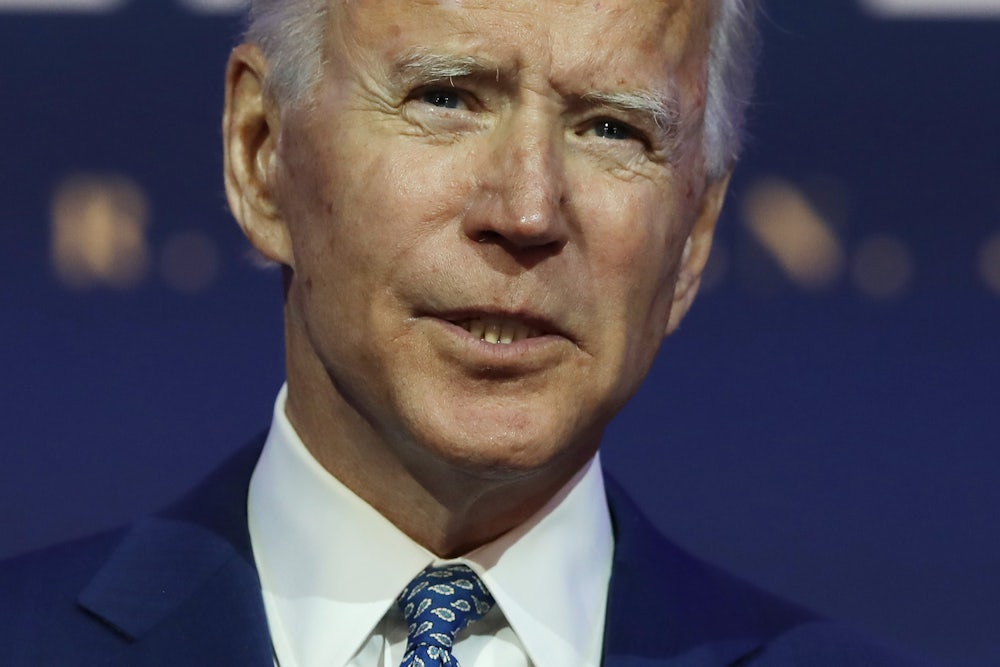Did Joe Biden’s much-publicized suggestion that he wanted to “transition” off fossil fuels during a presidential debate cost him the election? Evidently not. Biden is projected to flip Pennsylvania with a healthy margin, and he carried fossil fuel–producing states New Mexico and Colorado. Democrats did underperform further down the ballot, though, losing House seats where they were expected to gain them and floundering in their bid to take control of the Senate, which will remain Republican-dominated unless they can pull off an unlikely victory in a pair of special elections in Georgia. That leaves a divided government that will make the path toward anything like adequate climate action more difficult. With 2022 just around the corner, what will it take to put Democrats back into a position to pass big climate bills?
Some elder statesmen have already reached their conclusions. The past week has seen Democrats and Republicans—James Clyburn and John Kasich, Tim Ryan and Mitt Romney—blame the party’s lackluster performance on policies like defunding the police, the Green New Deal, and Medicare for All, offering scant evidence that these progressive battle cries actually led to a significant electoral backlash. Meanwhile, establishment types, including the Lincoln Project’s cast of grifters, have been eager to take credit for Biden’s victory and historic vote share, now shaping up to be the largest since Ronald Reagan’s reelection in 1984.
Everything good that happened for Democrats in this election, in other words, was the result of the Democratic Party business as usual. Everything bad was the left’s fault.
The party’s strategy for this election wasn’t all that different from its strategy in 2016: point out how dangerous and abhorrent Donald Trump is; keep policy details vague and focus instead on broad topics like “dignity” and “character.” That was at least good enough to take back the White House. But what’s its plan for when Trump is no longer on the ballot and can’t be saddled with a pandemic and recession?
As Representative Alexandria Ocasio-Cortez noted in a recent interview, candidates’ organizing strategies—their willingness to knock doors and spend money on digital campaigns—have more to do with winning than whatever ideas happen to be floating around the discursive ether. In key states, grassroots voter mobilization work from left stalwarts Ilhan Omar and Rashida Tlaib helped clinch key states, boosting turnout in Minneapolis and Detroit. And as my colleague Alex Pareene pointed out last week, what Democrats say may just not matter that much to most voters one way or another:
What if it barely matters what Democrats “talk about” or “campaign on”? What if this is less a problem of political messaging or positioning than of political education, information access, and ubiquitous propaganda? In other words, if the Democrats actively try to abandon “identity issues,” will anyone in this political environment actually stop associating them with “identity issues”?
The same questions face people trying to find the right way to talk about the climate crisis. Greens have spawned their own variant of the message-obsessed Beltway consultant class, drawn to abstract questions: Should we call it renewables or clean energy? Focus on solutions, or apocalypse? It’s hard to imagine any messaging at this point could make people believe a Democratic White House will improve their lives enough to be worth voting for, however well climate action and investing in wind and solar power might happen to poll. The burden is on Biden’s White House to prove a Democratic Party pursuing emissions cuts can make people’s lives better, and it will have to do so under less than ideal circumstances. Senate Majority Leader Mitch McConnell is likely to try to block anything that smells like climate policy, much less the more ambitious job creation agenda that Biden campaigned on. Oil and gas companies continuing to go bankrupt and shed jobs by the thousands will put a Biden administration in a difficult bind: getting blamed for a decline of oil and gas jobs while unable to pass the kinds of broad-based spending packages that could help stop the bleeding.
That could spell disaster in 2022, with backlash to energy job losses setting Democrats quickly down the Obama administration’s eight-year path of losing control over the House, Senate, and White House. That’s not to say Biden will be totally bound by a hostile Senate. But the gargantuan nature of the climate challenge—that is, upending the energetic basis of the global economy—means policies to address it can’t be sneaked in around the edges of politics through a few regulatory changes or executive orders. Social democracy is a bare minimum for easing people through that enormous transition and is anathema to both parties’ DNA. Whether or not the GOP resolves to give up the ghost of climate denial post-Trump, it doesn’t seem poised to support guaranteeing health care to laid-off oil and gas workers or fiscal support to communities whose tax bases stand to be devastated by an onslaught of bankruptcies. Democrats, for their part, remain mostly ambivalent about enlisting the government too much to create jobs and provide for basic needs, preferring anodyne language about lowering prescription drug prices and defending the Affordable Care Act.
The Democratic Party will have to figure out how to deliver real things for people if it wants to avoid a blowout loss in 2022 and preserve hope for climate policy that’s remotely in touch with the scale of the problem. Important as a creative and ambitious executive branch is at this point, it’ll ultimately take sustained Democratic majorities to bring greenhouse gas emissions down to zero. Historically, Democrats have won those by improving people’s lives, as Franklin Delano Roosevelt did after the New Deal. There’s no surefire way that will work this time around, but it’s worth trying, given that nothing else seems to be working. They might even manage to save a few thousand lives in the process.
